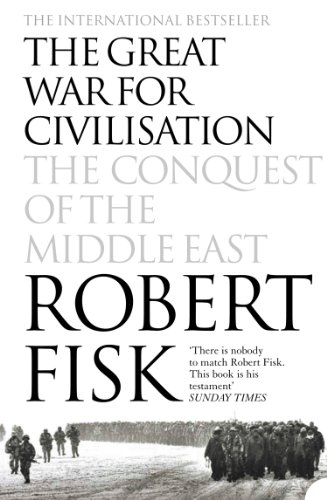
The Great War for Civilisation: The Conquest of the Middle East

They helped the Yemeni communists against the southern Yemeni Muslims and are helping Arafat’s regime fight Hamas.
Robert Fisk • The Great War for Civilisation: The Conquest of the Middle East
Bill Fisk’s war was helping to produce the century’s first genocide – that of a million and a half Armenians – laying the foundations for a second, that of the Jews of Europe.
Robert Fisk • The Great War for Civilisation: The Conquest of the Middle East
Howard K. Smith, who fled Nazi Germany on the last train from Berlin before Hitler declared war on the United States in 1941; James Cameron, whose iconic 1946 report from the Bikini atom tests was perhaps the most literary and philosophical article ever published in a newspaper.
Robert Fisk • The Great War for Civilisation: The Conquest of the Middle East
I smiled back the rictus of false friendship.
Robert Fisk • The Great War for Civilisation: The Conquest of the Middle East
The Saudi royal family had promised sharia laws while at the same time allowing the United States ‘to Westernise Saudi Arabia and drain the economy’. He blamed the Saudi regime for spending $25 billion in support of Saddam Hussein in the Iran – Iraq war and a further $60 billion in support of the Western armies in the 1991 war against Iraq, ‘buying
... See moreRobert Fisk • The Great War for Civilisation: The Conquest of the Middle East
were less an attempt at religious revival than a continuation of life in the vast dirt camps in which so many millions of Afghans had gathered on the borders of their country when the Soviets invaded sixteen years before.
Robert Fisk • The Great War for Civilisation: The Conquest of the Middle East
The Taliban had arrived not to rebuild a country they did not remember, but to rebuild their refugee camps on a larger scale.
Robert Fisk • The Great War for Civilisation: The Conquest of the Middle East
What kind of Islamic state would bin Laden wish to see? Would thieves and murderers still have their hands or heads cut off in his Islamic sharia state, just as they do in Saudi Arabia today? There came an unsatisfactory reply. ‘Islam is a complete religion for every detail of life. If a man is a real Muslim and commits a crime, he can only be
... See moreRobert Fisk • The Great War for Civilisation: The Conquest of the Middle East
1990, the year Saddam Hussein invaded Kuwait.